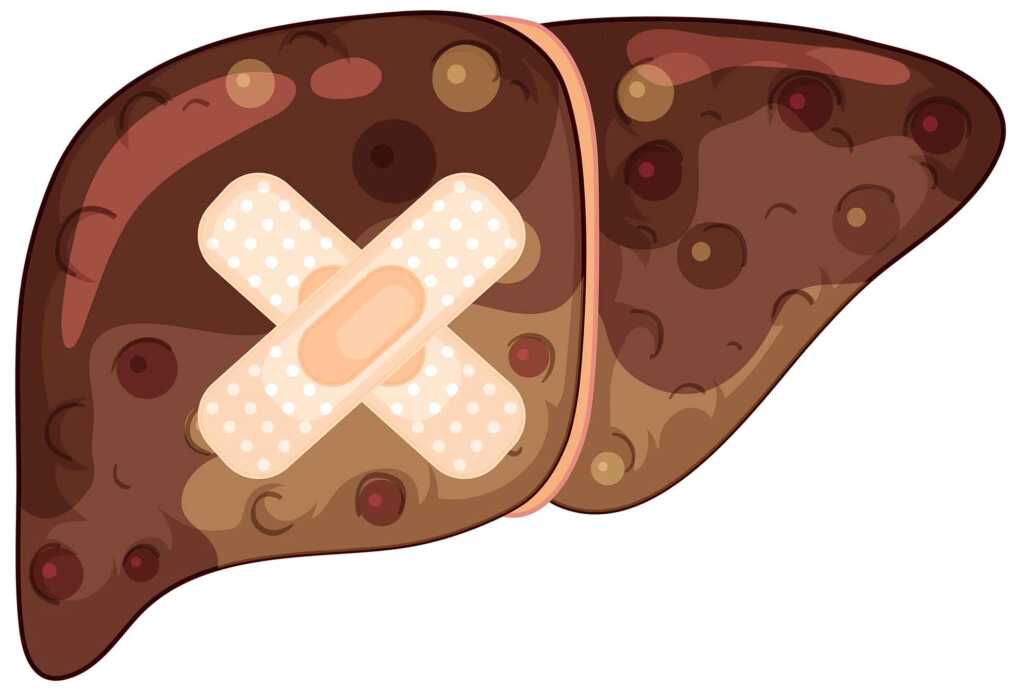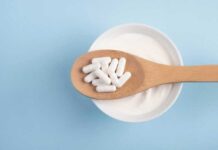
Fast Facts
- The liver naturally cleanses itself by breaking down toxins that enter the body.
- To best support liver health, people can focus on healthy habits like regular exercise and limited alcohol consumption.
- Experts recommend people eat a diet rich in foods that are known to support liver health, like fish high in omega-3s, cruciferous vegetables, and healthy seeds.
Do You Need To Cleanse Your Liver?
TikTok is full of creators claiming to cleanse their livers with a variety of homemade concoctions, including ingredients like apple cider vinegar, lemon, cayenne pepper, sea salt, and more.
Another side of social media touts supplements and herbs, like milk thistle, turmeric, and coenzyme Q10, for the same purpose.
A majority of these liver cleanses are not backed by adequate scientific research, and the people claiming their success are not healthcare professionals.
“Unfortunately, herbal products/supplements are not regulated by the FDA in the US, and have not been rigorously tested in clinical trials,” Cindy Sing Law, MD, a hepatologist at Northwell Lenox Hill Hospital, told Health.
She explained that supplements labeled “natural” are not necessarily safe.
“There have been an increasing number of products marketed as ‘liver cleanses,’ and they can be potentially harmful if they contain ingredients that can cause drug-induced liver injury,” Law said.
Some of these “cleanses” may also interact negatively with other medications, Kristin Kirkpatrick, RD, a registered dietitian at the Cleveland Clinic Department of Wellness and Preventive Medicine and president of KAK Nutrition Consulting, told Health.
Ultimately, what may be intended as a simple, holistic health venture could do more harm than good.
“The risk is dependent on the product and since there are so many variations of these products on the market, their risk will vary,” Kirkpatrick said. “Additionally, many ingredients found in some of these products could be purchased at your local grocery store and utilized more naturally in your dietary pattern. For example, adding turmeric to meals, or lemon to water.”
Here’s how to prioritize liver health in safe, sustainable ways, according to experts.
The Liver Naturally Cleanses Itself
This liver is one of the largest organs in the body. When it is functioning properly, the liver takes everything that is put into the body and converts nutrients it can use into substances, then it
gives cells those substances when they are needed.
The liver also:1
- Manages blood clotting
- Makes bile to digest fat
- Stores sugar for energy
- Makes protein for blood plasma
- Assists with digestion
The liver also disposes of toxic substances that enter the body so they are not harmful to the body.
“One of the liver’s functions in the body is the metabolism of drugs and detoxification of substances in the blood; therefore, it does not require cleansing,” said Law.
Rather than focusing on liver cleanses, Kirkpatrick said people should focus on caring for the liver so it performs as it should.
“The liver (alongside the kidneys) does everything you need to filter and rid the body of toxins and needs no additional assistance, just better care taken of it,” she said.
Avoiding Liver Disease and Liver Failure
4.5 million U.S. adults have been diagnosed with liver disease, according to the American Liver Foundation. If left untreated, liver disease can lead to liver failure and liver cancer.2
Some risk factors for liver disease include the following:2
- Excessive alcohol use
- Obesity
- Type 2 diabetes
- Tattoos or body piercings
- Family history of liver disease
Cirrhosis is a long-term liver disease that involves scarring of the liver. This condition affects how the liver functions. Causes of cirrhosis include:3
- Hepatitis and other viruses
- Long-term alcohol abuse
- Nonalcoholic fatty liver disease (NAFLD)
Arjmand Mufti, MD, medical director of liver transplantation and living liver transplantation at UTSouthwestern Medical Center, noted that NAFLD is now called metabolic dysfunction-associated steatotic liver disease (MASLD).4
“The prevalence of MASLD in adults is thought to be between 25%–30% in the general population and is the most common cause of chronic liver disease,” Mufti told Health.
In Law’s experience, excessive alcohol consumption is an incredibly common risk factor for liver disease. She noted that during the COVID-19 pandemic, there was an increase in alcohol use worldwide.
“With increased alcohol consumption, we have seen an increase in the prevalence of alcohol-related liver disease (ALD) and hospitalizations/liver transplants for ALD,” she said. “The rates of hospitalizations for ALD rose in particular among women and people under the age of 45.”
How to Prioritize Liver Health
To best prioritize liver health, Mufti recommends patients make a few necessary lifestyle changes that positively impact overall well-being.
“These include reducing alcohol use to within safe limits and avoiding binge drinking of alcohol,” he said. “If patients are diabetic, we advocate for good diabetic control and close monitoring in pre-diabetic patients, weight loss if patients are overweight, and treating high blood pressure and elevated cholesterol levels.”
He also noted the importance of regular exercise for cardiovascular health and overall wellness.
Kirkpatrick’s book, Regenerative Health: Discover Your Metabolic Type and Renew Your Liver for Life, recommends the following tips for prioritizing liver health:
- Follow a dietary pattern high in nutrient density, such as the Mediterranean diet
- Prioritize foods associated with reduced liver inflammation, such as cruciferous vegetables, fatty fish, nuts and seeds, and herbs and spices like turmeric56
- Limit ultra-processed foods
- Limit foods high in added sugars
- Limit carbohydrates stripped of fiber
- Manage stress
- Be physically active
- Get adequate sleep
- Drink lots of water
The American Liver Foundation suggests the following tips for selecting food while grocery shopping:7
- Choose raw vegetables and fruits that don’t have added salt, sugars, or sauces
- Pick poultry and fish that have skin prepared in a healthy way
- Lean toward fish with omega-3 fatty acids, such as salmon, trout, and herring
- Buy fat-free or low-fat dairy products
- Avoid foods with hydrogenated vegetable oils, saturated fat, and trans fat
- Limit added sugar intake
- Select foods low in sodium
Sources:
- American Liver Foundation. Understanding your liver: location, function, and complexity.
- American Liver Foundation. How many people have liver disease?.
- American Liver Foundation. Cirrhosis of the liver.
- American Association for the Study of Liver Diseases. Multinational liver societies announce new “fatty” liver disease nomenclature that is affirmative and non-stigmatizing.
- Rajaram S, Damasceno NRT, Braga RAM, Martinez R, Kris-Etherton P, Sala-Vila A. Effect of nuts on markers of inflammation and oxidative stress: a narrative review. Nutrients. 2023;15(5):1099. doi:10.3390/nu15051099
- Li HY, Gan RY, Shang A, et al. Plant-based foods and their bioactive compounds on fatty liver disease: effects, mechanisms, and clinical application. Oxid Med Cell Longev. 2021;2021:6621644. doi:10.1155/2021/6621644
- American Liver Foundation. 10 Healthy supermarket tips.
Important Notice: This article was originally published at www.health.com by Cathy Cassata where all credits are due. Medically reviewed by Nick Blackmer
Disclaimer
The watching, interacting, and participation of any kind with anything on this page does not constitute or initiate a doctor-patient relationship with Dr. Farrah™. None of the statements here have been evaluated by the Food and Drug Administration (FDA). The products of Dr. Farrah™ are not intended to diagnose, treat, cure, or prevent any disease. The information being provided should only be considered for education and entertainment purposes only. If you feel that anything you see or hear may be of value to you on this page or on any other medium of any kind associated with, showing, or quoting anything relating to Dr. Farrah™ in any way at any time, you are encouraged to and agree to consult with a licensed healthcare professional in your area to discuss it. If you feel that you’re having a healthcare emergency, seek medical attention immediately. The views expressed here are simply either the views and opinions of Dr. Farrah™ or others appearing and are protected under the first amendment.
Dr. Farrah™ is a highly experienced Licensed Medical Doctor certified in evidence-based clinical nutrition, not some enthusiast, formulator, or medium promoting the wild and unrestrained use of nutrition products for health issues without clinical experience and scientific evidence of therapeutic benefit. Dr. Farrah™ has personally and keenly studied everything she recommends, and more importantly, she’s closely observed the reactions and results in a clinical setting countless times over the course of her career involving the treatment of over 150,000 patients.
Dr. Farrah™ promotes evidence-based natural approaches to health, which means integrating her individual scientific and clinical expertise with the best available external clinical evidence from systematic research. By individual clinical expertise, I refer to the proficiency and judgment that individual clinicians acquire through clinical experience and clinical practice.
Dr. Farrah™ does not make any representation or warranties with respect to the accuracy, applicability, fitness, or completeness of any multimedia content provided. Dr. Farrah™ does not warrant the performance, effectiveness, or applicability of any sites listed, linked, or referenced to, in, or by any multimedia content.
To be clear, the multimedia content is not intended to be a substitute for professional medical advice, diagnosis, or treatment. Always seek the advice of your physician or other qualified health providers with any questions you may have regarding a medical condition. Never disregard professional medical advice or delay in seeking it because of something you have read or seen in any website, video, image, or media of any kind. Dr. Farrah™ hereby disclaims any and all liability to any party for any direct, indirect, implied, punitive, special, incidental, or other consequential damages arising directly or indirectly from any use of the content, which is provided as is, and without warranties.








